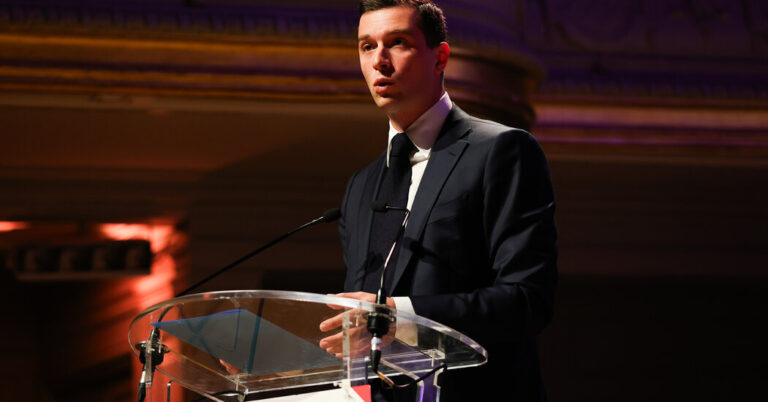France’s far-right National Rally party and its competing left-wing coalition, the New Popular Front, promise to save the country from financial ruin.
But French leaders on Thursday gave a cool reception to rival parties’ competing economic programs, warning that both could endanger the French economy and push France away from the European Union.
With less than two weeks to go pivotal legislative electionsMembers of MEDEF, France’s main employers’ organization, held an “audition” for candidates from the main political parties vying to take power from President Emmanuel Macron, whose government was severely weakened after his party was defeated by the far right. in the elections to the European Parliament.
Mr. Macron called for early legislative elections, betting that voters would reject the extremes and embrace his centrist Renaissance party. The first round of voting is scheduled for June 30 and the last for July 7.
Thursday, in a packed Parisian concert hall, business leaders grilled Jordan Bardella, the National Rally candidate, on how he would finance a public order program and booed when far-left candidates called for a wealth tax on billionaires. They applauded Finance Minister Bruno Le Maire, who primarily campaigns for Mr. Macron and whose business-friendly policies are seen as helping to reinvigorate economic growth.
Patrick Martin, the president of MEDEF, set the tone, taking the stage at the start of the event with the heads of other business groups to criticize what he called unrealistic and wasteful populist commitments.
The buzz was palpable when Mr. Bardella, the fiery protégé of the leader of the National Rally, Marine Le Pen, and, at 29, the new face of the rising right, appeared for the first time in public with the leader of the great French conservative party. , Eric Ciotti. Last week, Mr. Ciotti broke a political taboo by concluding an alliance with the nationalist right. As the two men presented their argument that the French economy would be better off if they took the reins of power, the buzz faded to a low murmur.
Leaders in the audience took turns asking Mr. Bardella questions about his party’s views on economic policy, immigration and international investment. The young politician, a magnetic orator who took care to present a polished image in a tailored suit and dark ties, ticked off a list of priorities should he find himself in the once unthinkable role of French prime minister, alongside M Macron.
These include reducing taxes on energy, gas and electricity for French households, reducing income tax for citizens under 30 and encouraging businesses to increase taxes. wages by 10 percent. Immigrants with working papers and paying taxes could stay, he explained, but would be required to leave France if they were unemployed for six months after their last job. He added that the National Rally would finance more social spending for native French people by no longer allowing illegal immigrants access to the French health system.
“I understand that we need to reassure people economically,” Mr. Bardella told the crowd. “Our ambition is to restore order in the country, in the streets and in France’s finances.”
At the other end of the spectrum was the platform of the New Popular Front. Investors fear the coalition, which includes the Socialist, Green and Communist parties, will throw financial prudence aside by pledging to raise the minimum wage, lower the retirement age to 60 and freeze prices essential products to help households shaken by inflation. .
Business leaders booed when Eric Coquerel, a representative of the left-wing La France Insoumise party, pointed the finger at some members of the audience as he criticized companies for caring more about profit margins than people. “We want billionaires to pay more taxes,” he said.
THE Montaigne Institute, a think tank in Paris, said in a report on Thursday that the campaign programs of the three main political parties would each cost more than 10 billion euros ($10.71 billion) a year. The platform of the New Popular Front coalition would cost nearly 30 billion euros, more than any other.
But French business does not necessarily influence the opinions of people in the streets: the latest political poll, published Thursday by the research firm IFOP, shows that the National Rally would obtain 34 percent of the parliamentary votes, while the Popular Front would reach 29 percent. percent. Mr. Macron’s Ensemble bloc would get 22 percent, not enough to avoid a stalemate.
The crowd was friendly toward Mr. Le Maire, who addressed some in the audience in familiar terms and again warned that France would descend into chaos if either the far right or the far left ruled. the country.
The European Union hit France with punishments Wednesday for violating rules that require countries to maintain strict budgetary discipline. But business leaders have not forgotten that Mr Le Maire oversaw a program to support employers and employees during the pandemic through a 300 billion euro spending spree that is one of the main causes of France’s disproportionate deficit and debt today.
“Without this program, many businesses would have gone bankrupt and workers would have been left destitute,” said Katy Jeandidier, who runs Vivre Adom, a small business that provides in-home care for seniors. “They protected us, and now we want things to remain stable with this election. »
But Michel Picon, president of U2P, the French trade group for local businesses, acknowledged that the National Rally had made great progress amid growing insecurity in the country’s towns and villages.
He said small business owners in these areas were feeling increasingly threatened by a sharp rise in petty crime. Voters appeared to link this to illegal immigration, which Mr Picon said also fuels backlash against legal immigrants who worked in France – and on whom many companies depend for their workforce.
“We need more order in this country,” he said. “But we must also protect working immigrants who had nothing to do with these actions.”


